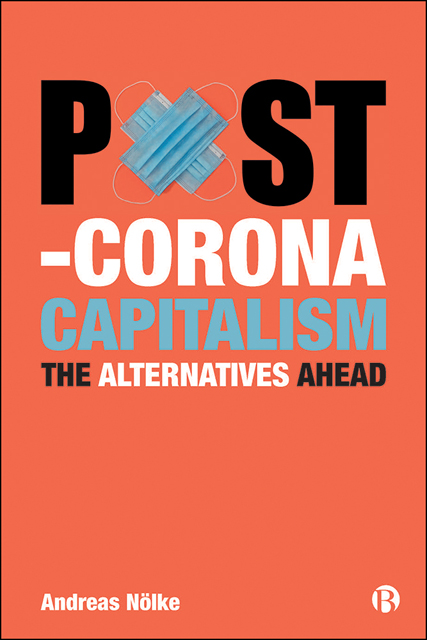Book contents
- Frontmatter
- Dedication
- Contents
- List of Abbreviations
- Acknowledgements
- Preface
- 1 Introduction: Confronting a Multidimensional Crisis of Capitalism
- Part I Capitalism and Society
- Part II Domestic Institutions of Capitalism on the Demand Side
- Part III Domestic Institutions of Capitalism on the Supply Side
- Part IV The International Institutions of Capitalism
- Part V Anthropocene Capitalism
- Part VI Geo-economic Shifts in Global Capitalism
- Part VII Ideologies in Contemporary Capitalism
- References
- Index
21 - Intellectual Property Rights: Global Commons for Vaccines or Private Property?
Published online by Cambridge University Press: 13 October 2022
- Frontmatter
- Dedication
- Contents
- List of Abbreviations
- Acknowledgements
- Preface
- 1 Introduction: Confronting a Multidimensional Crisis of Capitalism
- Part I Capitalism and Society
- Part II Domestic Institutions of Capitalism on the Demand Side
- Part III Domestic Institutions of Capitalism on the Supply Side
- Part IV The International Institutions of Capitalism
- Part V Anthropocene Capitalism
- Part VI Geo-economic Shifts in Global Capitalism
- Part VII Ideologies in Contemporary Capitalism
- References
- Index
Summary
During the coronavirus crisis, the fast production of pharmaceutical products to detect, prevent and heal virus infections has become an issue of utmost urgency. At the same time, this has led to the question why products related to similar diseases have not been produced much earlier. Some observers have argued that this neglect is due to the limited financial incentives for the pharmaceutical industry, particularly with regard to vaccines. Moreover, after the development of vaccines, their mass-scale production arguably was limited because pharmaceutical companies were worried about the loss of their intellectual property rights. Whereas the one side argued that patent protection should be relaxed or even abolished in order to make vaccines quickly available to as many people as possible – most notably including the global poor – the other side warned that this proposal would weaken the incentives for pharmaceutical companies to invest resources into vaccine development in the future. Which side has the better arguments?
Intellectual property rights in global trade institutions
During the last decades, the pharmaceutical industry has been a prime topic for students of International Political Economy, particularly because of the controversial debates on the protection of intellectual property rights by international institutions such as the agreement on Trade-Related Intellectual Property Rights (TRIPS) of the World Trade Organization (WTO). At the background of these debates are four fundamental trends that have increased the importance of intellectual property during the last decades (Balaam and Dillman, 2014: 238). First, it has become increasingly obvious that economic growth and political power today more and more depend on knowledge and human capital in fields like engineering and ICT, instead of traditional resources such as control of land. Second, profits increasingly do not accrue to those who manufacture a product, but rather to those that develop, design and market products (think, for example, of the distribution of iPhone profits between Apple and manufacturing companies such as Foxconn). Third, although the flow of information is difficult to control, most governments try to make sure that their knowledge economies flourish, based on the investment of substantial resources, but also the desire to reserve as much as possible the resulting economic benefits for themselves and their national companies.
- Type
- Chapter
- Information
- Post-Corona CapitalismThe Alternatives Ahead, pp. 130 - 135Publisher: Bristol University PressPrint publication year: 2022



